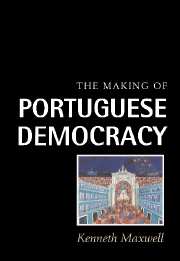Book contents
1 - Prisoners of history
Published online by Cambridge University Press: 24 November 2009
Summary
A libertarian may properly disapprove of Dr. Salazar, but I doubt whether Plato would.
Dean Acheson, US secretary of state (1950)Dictatorships of this type are sometimes necessary in countries whose political institutions are not so far advanced as ours.
President Dwight D. Eisenhower (1960)I want this country poor but independent; and I do not wish it colonized by American capital.
Salazar (1963)I love Portugal because it is a country of political unreality.
André Malraux (1960)During Portugal's golden age of exploration, in the late fifteenth and early sixteenth centuries, its mariners – Vasco da Gama, Bartolomeu Dias, Pedro Alvares Cabral, and Ferdinand Magellan – vastly expanded the world known to the Europeans. The Portuguese established colonies in Africa, the Far East, and South America. The places where they landed added scores of new names to Europe's commercial lexicon – Luanda, Mombasa, the Maldives, Ormuz, Diu, Goa, Macao, Malacca, Malindi, Timor, Rio de Janeiro. The Portuguese named the waters off Salvador, their first capital in Brazil, the Bay of All Saints (and nicknamed it the Bay of All the Sins). They also exported such European innovations as the movable-type printing press, which they introduced in the Middle East and possibly Japan. Portuguese words entered the languages of the Japanese (“tempura”), the Indians (“Caste”), and other distant peoples. In sum, as Lisbon would never forget, it was the Portuguese who first “linked up, for better and for worse, the widely sundered branches of the great human family,” as historian Charles R. Boxer has noted.
- Type
- Chapter
- Information
- The Making of Portuguese Democracy , pp. 7 - 29Publisher: Cambridge University PressPrint publication year: 1995

